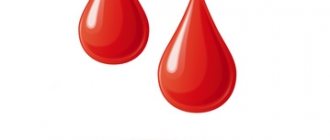How long does diarrhea usually last?
In most cases, diarrhea lasts 1–2 days, although in some cases the condition may last longer.
The exact duration depends on the underlying cause (). The National Institute of Diabetes and Digestive and Kidney Diseases (NIDDK) divides the condition into three groups depending on its duration ():
- Acute diarrhea : lasts 1–2 days and resolves without treatment.
- Persistent diarrhea : Diarrhea that persists for 2–4 weeks.
- Chronic diarrhea : persistent or intermittent diarrhea lasting more than 4 weeks.
What diagnostic methods are used
To find out why an adult has severe diarrhea that does not stop for more than 10 days, the following tests are done:
- General blood and urine tests.
- Stool analysis.
- Bac sowing.
- Testing for helminthic infestations.
- Coprogram for hidden blood.
- Steatorrhea detection test.
- Test for identifying infectious agents of diarrhea.
Instrumental diagnostics are also used, especially if there is blood in the stool and other signs of the possible development of cancerous tumors. These are biopsy, sigmoidoscopy, irrigography. Differential diagnosis plays an important role. Sometimes the cause of prolonged stool is determined only by excluding all possible pathologies.
Causes of diarrhea that lasts more than a week
Persistent and chronic diarrhea can last more than a week, according to the NIDDK. Both types can have different causes.
Causes of persistent diarrhea
Below are the most common causes of persistent diarrhea.
Infections
Persistent diarrhea can result from viral, bacterial, or parasitic infections.
Below you will learn about the different types of pathogens that commonly cause diarrhea and how they enter the body.
- Viruses (norovirus, rotavirus, viral gastroenteritis) . Can enter the body by inhaling infected droplets when another person coughs or sneezes. They can also be introduced into the body by touching a surface that has been in contact with infected droplets and then touching the eyes, nose or mouth.
- Bacteria (campylobacter, E. coli, salmonella, shigella) . They enter the body with contaminated food or water.
- Parasites (cryptosporidiosis, dysenteric amoeba, intestinal lamblia) . They enter the body with contaminated food or water.
Traveler's diarrhea
Traveler's diarrhea (TD) is the medical term for diarrhea that occurs as a result of eating food or water contaminated with viruses, bacteria, or parasites.
Its name comes from the fact that it usually develops when people travel to countries with poor sanitation conditions.
According to the NIDDK, DP usually causes acute diarrhea, although some parasitic infections can cause persistent diarrhea ().
Side effects of medications
Some medications may cause diarrhea as a side effect. Here are examples of drugs that can cause diarrhea:
- antibiotics
- antacids containing magnesium
- high blood pressure medications
- anticancer drugs
Causes of chronic diarrhea
Below we explore the possible causes of chronic diarrhea.
Infections
Without treatment, some bacterial and parasitic infections can cause chronic diarrhea.
After an infection, people may have trouble digesting certain carbohydrates and proteins. This may prolong the duration of diarrhea.
Food allergies and intolerances
Chronic diarrhea can sometimes indicate a food allergy or intolerance. Food intolerance is when a person has difficulty digesting certain foods. This may lead to stomach upset and diarrhea.
Here are some common types of food intolerances:
- Lactose intolerance : the inability to properly digest lactose, the sugar found in milk and dairy products.
- Fructose intolerance : When the body cannot properly digest fructose, the sugar in fruits, fruit juices and honey.
- Gluten intolerance : When a person is unable to properly digest the gluten proteins found in grains.
In addition to the above, some people may have difficulty breaking down the sugar alcohol in some sugar-free foods. Here are examples of sugar alcohols:
- sorbitol
- mannitol
- xylitol
Digestive tract diseases
Chronic diarrhea can sometimes indicate a problem with the digestive tract.
Here are some gastrointestinal diseases that can cause chronic diarrhea:
- irritable bowel syndrome
- bacterial overgrowth in the small intestine
- celiac disease
- inflammatory bowel diseases such as ulcerative colitis and Crohn's disease
Abdominal surgery
A person may develop chronic diarrhea after surgery on the following organs:
- stomach
- appendix
- gallbladder
- small or large intestine
- liver
- pancreas
- spleen
Long-term use of antibiotics
Long-term use of antibiotics can also change the balance of good and bad gut bacteria. This may make a person more susceptible to infection with the diarrhea-causing bacteria Clostridium difficile (Clostridium difficile).
First aid
If the unpleasant disease has become protracted, then it would be best to consult a doctor to diagnose the disease and find out the reasons for its occurrence, however, long-term diarrhea in an adult can be treated independently:
1. You need to drink any sorbent drug that will help the diseased gastrointestinal tract (Smecta, Filtrum-Sti, activated angle).
2. Since diarrhea is very dangerous due to dehydration, you need to drink large amounts of boiled water or weak, unsweetened tea.
3. Drinking herbal teas will help replenish the supply of nutrients, vitamins and minerals lost during the disease. If diarrhea is accompanied by fever, linden or currant tea, which has an antipyretic and diaphoretic effect, will have a positive effect.
4. Performing a cleansing enema. Water released during diarrhea washes away not only beneficial microelements, but also various pathogenic bacteria and toxins. Through diarrhea, the body tries to get rid of toxins. Using an enema cleanse will help remove bacteria that was not passed through the stool. This will prevent the possibility of them being reabsorbed into the intestinal walls and causing the problem to reoccur. Washing should also be done because it has an additional beneficial effect - reducing elevated body temperature due to the absorption of water.
Enema treatment includes the use of not only clean water, but also decoctions of various medicinal herbs (chamomile, sage, oak). For them, make a solution at room temperature. For adults, enemas with a volume of 750 ml to 2 liters are used.
Diet for diarrhea
An important factor in the treatment of loose stools is adherence to a special diet. A diet for diarrhea in an adult or child includes drinking large amounts of neutral liquid.
During prolonged diarrhea, you need to follow the following dietary rules:
1. The basis of the diet is liquid food, low-fat soups and broths, light puree.
2. The diet requires foods rich in fiber (baked apples, bananas, dried fruits). For bread, preference is given to white or bran.
3. Cereal porridges should be made mucous or semi-mucous. Large grains are strictly prohibited, as they can injure already irritated intestinal walls.
4. Lean meat and fish are allowed.
When treating diarrhea, the following are prohibited:
- Fresh vegetables and fruits.
- Seasonings, large amounts of sugar and salt, green tea, coffee.
- All types of canned, smoked and dried foods.
- Any carbonated drinks, all types of dairy products.
- Fatty, unhealthy foods that interfere with the normalization of intestinal function.
Treatment of diarrhea with medications
Before deciding how to treat diarrhea, you must first find out the cause of the disease.
For diarrhea of any type, the following will definitely be prescribed:
- Sorbents (Activated carbon, Smecta).
- Preparations that restore ionic balance after dehydration (Regidron).
- Antidiarrheals (Loperamide, Imodium).
- Pro- and prebiotics that restore the balance of intestinal microflora (Bifiform, Linex).
If the diarrhea was caused by a disease of an infectious nature, then the specialist doctor will prescribe for admission:
- Antibiotics (tetracyclines, macrolides, amoxicillins).
- Intestinal antiseptics (Furazolidone, Ftalazol, Sulgin).
These drugs should not be used for self-medication. Doing this is strictly contraindicated because they are selected according to the results of research and analysis. They are selected individually for adults and children. The patient must take a course of them.
Treating diarrhea at home
Below are some remedies that can help relieve diarrhea and its associated symptoms.
Over-the-counter medications
There are two main types of over-the-counter antidiarrheal medications ():
- Loperamide . This drug is sold under the brand name Imodium. It slows down digestion so that the body can get more water from the intestines. This helps make stool more dense and reduces the frequency of bowel movements.
- Bismuth subsalicylate . This medication is available as Pepto-Bismol. It works by coating and killing some of the intestinal bacteria that cause diarrhea.
Changing your diet
People with diarrhea may find that eating soft, easy-to-digest foods can provide nutrients, soothing the stomach and relieving symptoms.
One such diet is the BRAT diet, which stands for bananas, rice, applesauce and toast. Other foods that a person can eat if they have an upset stomach are:
- stewed or boiled vegetables
- scrambled eggs
- bouillon
- chicken or turkey without skin
- White bread
- White rice
- saltine crackers
- oatmeal
People should also avoid foods that can make stomach upset and diarrhea worse, such as:
- fried, fatty or spicy foods
- milk and dairy products, except plain yogurt and kefir ()
- fish
- red meat
- raw vegetables
- citrus
- candies
- carbonated drinks
- very hot or cold drinks
- caffeine
- alcohol
Drinking large amounts of liquid
Diarrhea can lead to loss of fluid and essential electrolytes, which can lead to dehydration.
Drinking plenty of fluids will help reduce this risk. You can drink the following drinks:
- pure water
- low sugar fruit juices
- low sugar sports drinks
- clear broths
Folk remedies
If your stomach hurts for the fourth day and diarrhea does not stop during this period of time, you should begin treatment after consulting with your doctor. Once the cause of diarrhea is established, therapy can be prescribed. For these purposes, it is possible to use such recipes.
- Pharmacies sell ready-made dried oak bark. Take 1 tbsp. l. bark and pour a glass of boiling water. Leave to brew for 60 minutes, then strain thoroughly. Drink several tablespoons of tincture throughout the day; the effect will become noticeable after 2 days. When this does not happen, then other methods of alternative treatment for diarrhea in adults should be used. After several hours, the procedure is repeated, and to avoid dehydration, drink plenty of fluids.
- Rice porridge or a decoction of it will help perfectly. It's quite easy to prepare. For 0.5 l. 1.5 tsp of boiling water is needed. rice This mixture is cooked over low heat for 40 minutes. Afterwards you need to wait until the mass has cooled down and then filter it thoroughly. Drink 1/4 glass every 3 hours. The effect will become noticeable quite quickly.
- The recipe for a decoction of pomegranate peels is especially popular. While preparing this remedy, you should wash the pomegranate, wipe it thoroughly and then peel it. Before drying, cut off all the pulp. Peels are stored in a dry and warm place. When the need arises, take 1 teaspoon of dry crusts and add 1 liter of water. Then cook in a water bath for 15 minutes, leave to brew for at least 40 minutes. During prolonged diarrhea in adults, treatment consists of drinking 2 tsp. decoction, but no more than 5 times a day. When the drug is taken appropriately, the effect can be noticed within the next day.
- Vodka with salt is considered an effective way against prolonged diarrhea in adults. Take a glass of vodka and salt in any quantity. Before taking it, you need to dilute the product with warm water and drink it on an empty stomach several times a day.
- It is possible to eliminate diarrhea through such a method as strong black tea. For treatment, brew 2 times more tea than usual and add a small amount of sugar. Drink tea several sips throughout the day.
- Black pepper also helps in this case. Swallow 10 peas whole and wash down with a large volume of warm water. After half an hour, changes will begin. A similar recipe can also be used to treat diarrhea in children. Those who struggle with stomach problems should use pepper carefully, as this causes significant complications and extremely poor health.
We recommend: How to treat yellow diarrhea in an adult
It is necessary to establish in advance the cause of prolonged diarrhea and treat it, since eliminating the symptoms is not enough to get rid of the causative agent of the disease.
Causes requiring special treatment
Treatment for persistent or chronic diarrhea depends on the underlying cause. Below are some possible causes and treatment options.
Infections
Your doctor may prescribe a course of antibiotics to treat a chronic bacterial infection or antiparasitic medications to treat a parasitic infection.
Food allergies and intolerances
If you suspect you have a food allergy or intolerance, your doctor may recommend keeping a food diary.
You can use your journal to record the foods you eat every day and the symptoms you experience. Over time, this will help you identify foods that may cause diarrhea.
Treatment for food allergies or intolerances typically involves avoiding known trigger foods.
Digestive tract diseases
Treatment for digestive problems depends on the type of disease. Depending on the cause, this may include one or more of the following:
- avoiding certain foods
- taking medications to control the disease
- taking medications to relieve diarrhea and other gastrointestinal symptoms
- surgery to treat the underlying disease
Summarize
Diarrhea that lasts more than a week may be persistent or chronic.
Persistent diarrhea lasts up to 4 weeks. This condition is usually the result of an infection or a side effect of medications.
Chronic diarrhea is diarrhea that lasts 4 weeks or more. There are many potential causes of this problem, including untreated infections, food allergies and intolerances, and underlying digestive tract conditions.
Anyone suffering from diarrhea that persists for more than 2 days should visit their doctor for a diagnosis and appropriate treatment.










